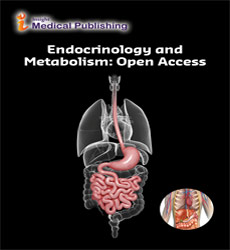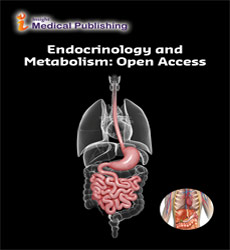A Level of Priority towards Research in Endocrinology
Nabil Mohie*
Department of Biochemistry, Kafrelsheikh University, Egypt
- *Corresponding Author:
- Nabil Mohie
Department of Biochemistry
Kafrelsheikh University, Egypt
Tel: 201006426999
E-mail: nabilmohi@yahoo.com
Received Date: September 11, 2020; Accepted Date: September 24, 2020; Published Date: September 30, 2020
Citation: Mohie N (2020) A Level of Priority towards Research in Endocrinology. Endocrinol Metab Vol. 4 No.4:4. DOI: 10.36648/endocrinology-metabolism.4.4.4
Copyright: © 2020 Mohie N. This is an open-access article distributed under the terms of the Creative Commons Attribution License, which permits unrestricted use, distribution, and reproduction in any medium, provided the original author and source are credited.
Abstract
Endocrinology is the study of hormones. Hormones are essential for our every-day
survival. They control our temperature, sleep, mood, stress, growth and more. An
endocrinologist is a doctor that treats diseases related to problems with hormones.
A hormone is a chemical messenger that travels from one cell to another.
Research scope in endocrinology is vast around the world today. Many researches
are going on and improvising the study aspects day by day.
Endocrinology and study of metabolism together collaborate forming
Endometabolism. This note states about the platform for publication of papers in
the related field.
Keywords
Endocrinology; metabolism; Carbohydrate; Diabetes Mellitus; Pituitary Adenoma
Editorial Note
Endocrinology and Metabolism: Open Access is internationa peer-reviewed open access journal which has vast scope in both endocrinology and metabolism research study. Journal has a very active editorial board member and reviewers which make the submitted manuscript to complete the peer-review process within 21 days of submission.
Recent research articles online are very unique in the study. For a glance, an editorial by our chief editor Hiroshi Bando in volume 4 issue 1 entitled “The Influence of Carbohydrate in Foods and Beverages for Infants and Adults” described some recent topics including the role of carbohydrate in the human evolution, excessive intake of carbohydrate in infants from the reports of PHE and RCPCH, the influence of sugary beverage on the cancer risk in adults and so on. It is expected that these become the reference to develop further research in the future [1-3].
In volume 4 issue 2 a research article by Teklewoini Mariye, College of Health Science and Comprehensive Specialized Hospital, Aksum University, Tigray, Ethiopia entitled “Determinants of Poor Glycemic Control among Diabetes Mellitus Patients in Public Hospitals of the Central Zone, Tigray, North Ethiopia, 2018: Unmatched Case-Control Study” describe Poor glycemic control is a major determinant for complications of diabetes mellitus. In order to prevent the complications, identifying the determinants of poor glycemic control are imperative [4]. However, only few studies were conducted related to this topic, particularly in Tigray. Hence, this study was aimed at identifying the determinants of poor glycemic control in the Centeral Zone of Tigray, North Ethiopia [5,6].
In our recent issue 3 of volume 4 a detailed research paper by Abnet Wondimu, Department of Internal Medicine, Addis Ababa University, Ethiopia was published entitled “Clinical, Laboratory, Radiologic feature, and Treatment Outcome of Pituitary Adenoma in Tikur Anbessa Specialized Hospital, Ethiopia” describes Pituitary adenomas are prevalent intracranial malignancy accounting for 6%-10% of all symptomatic intracranial tumors and reach 22.5% in autopsy studies. Pituitary adenomas can present with varied clinical manifestations that include symptoms of excessive hormone secretion, signs of hormone shortage and those related to pressure effects. Despite the common occurrences of pituitary adenomas, there is no adequate data in Ethiopia [7]. The article give conclusion that the data collected in the study provided an overview of the patients with Pituitary adenoma. Overall seventy-five (75%) were functional pituitary adenoma while the rest twenty-five (25%) was a non-functional pituitary adenoma. Among the functional adenoma, prolactinoma was the commonest Pituitary adenoma subtype followed by growth hormone secreting adenoma [8].
Endocrinology and Metabolism: Open Access aims to function as the global face of endocrinology research. We feel great for such collaboration. Journal accepts paper submission throughout the year for author convenience purpose. Authors may submit their paper online directly to editors. Finally, I thank all the board members for their efforts towards the journal and review writers who give their genuine review comments for quality publication. Authors who has contributed to the journal are never been back choosing our journal. We thank them and wish them for great research in the field of endocrinology.
References
- Bando H (2019) The role of ketone bodies is indispensable to human life. J Clin Nutr Metab 3: 1.
- Clark JB, Bates TE, Cullingford T, Land JM (1993) Development of enzymes of energy metabolism in the neonatal mammalian brain. Dev Neurosci 15: 174-180.
- NHS, United Kingdom (2019) Statistics on Obesity, Physical Activity and Diet, England, 2019.
- Brunner LS, Brunner (2010) Suddarth's textbook of medical- surgical nursing. Lippincott Williams and Wilkins. 1.
- Zimmet PZ (2017) Diabetes and its drivers: the largest epidemic in human history? Clinical Diabetes and Endocrinology. 3: 1.
- Cho NH, Shaw JE, Karuranga S, Huang Y, Da Rocha Fernandes JD, et al. (2018) IDF Diabetes Atlas: global estimates of diabetes prevalence for 2017 and projections for 2045. Diabetes Research and Clinical Practice. 138: 271-281.
- Costello RT (1936) Subclinical adenoma of the Pituitary gland. Am J Pathol 12: 205-216.
- Ezzat, Asa SL (2007) Mechanisms of disease: The clinical, pathological, and genetic features of familial isolated pituitary adenomas. Eur J Endo 157: 371-382.

Open Access Journals
- Aquaculture & Veterinary Science
- Chemistry & Chemical Sciences
- Clinical Sciences
- Engineering
- General Science
- Genetics & Molecular Biology
- Health Care & Nursing
- Immunology & Microbiology
- Materials Science
- Mathematics & Physics
- Medical Sciences
- Neurology & Psychiatry
- Oncology & Cancer Science
- Pharmaceutical Sciences
